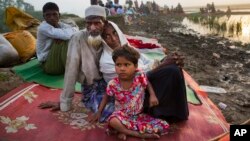The U.N. says more than 611,000 Rohingya refugees have arrived in Bangladesh from Myanmar since Aug. 25. In a survey of more than 500,000 of them, the refugee agency found that one-third are vulnerable and in need of special assistance.
The survey took place in the Kutupalong camp, in numerous makeshift settlements and extension areas in Cox’s Bazar. It was conducted jointly by the U.N. refugee agency and Bangladesh’s Relief and Repatriation Commission.
The UNHCR said more than 100 people were hired to go shelter to shelter to gather data on more than 120,000 families, or nearly 518,000 refugees. The agency’s spokeswoman, Duniya Aslam Khan, says most of the earliest arrivals in Bangladesh were women and children.
She told VOA the U.N. decided to conduct this survey to assess their vulnerability and see what help was most needed.
“And, according to the data so far collected,” Khan said, “we have a number of households headed by single mothers without any male support. We have younger children who are now taking care of their siblings. We have elderly grandparents who have no support from younger family members because they are either killed or separated.”
Khan says many people suffer from various disabilities and many children are separated from their families. She says all these people will require special life-saving support.
She says the findings will be shared with government authorities and all humanitarian agencies. She says an analysis of the data will permit aid agencies to target their assistance where it will do the most good.











